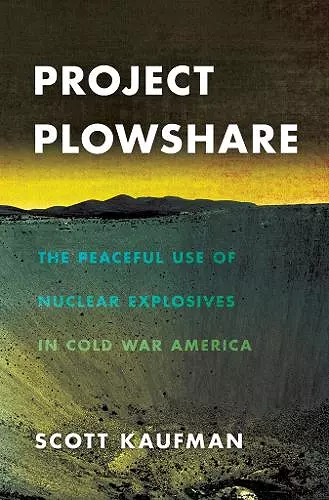Project Plowshare
The Peaceful Use of Nuclear Explosives in Cold War America
Format:Hardback
Publisher:Cornell University Press
Published:15th Dec '12
Currently unavailable, and unfortunately no date known when it will be back

Inspired by President Dwight D. Eisenhower’s "Atoms for Peace" speech, scientists at the Atomic Energy Commission and the University of California’s Radiation Laboratory began in 1957 a program they called Plowshare. Joined by like-minded government officials, scientists, and business leaders, champions of "peaceful nuclear explosions" maintained that they could create new elements and isotopes for general use, build storage facilities for water or fuel, mine ores, increase oil and natural gas production, generate heat for power production, and construct roads, harbors, and canals. By harnessing the power of the atom for nonmilitary purposes, Plowshare backers expected to protect American security, defend U.S. legitimacy and prestige, and ensure access to energy resources.
Scott Kaufman’s extensive research in nearly two dozen archives in three nations shows how science, politics, and environmentalism converged to shape the lasting conflict over the use of nuclear technology. Indeed, despite technological and strategic promise, Plowshare’s early champions soon found themselves facing a vocal and powerful coalition of federal and state officials, scientists, industrialists, environmentalists, and average citizens. Skeptical politicians, domestic and international pressure to stop nuclear testing, and a lack of government funding severely restricted the program. By the mid-1970s, Plowshare was, in the words of one government official, "dead as a doornail." However, the thought of using the atom for peaceful purposes remains alive.
Kaufman convincingly demonstrates that Plowshare is a valuable lens to look at the Cold War, at how policy-making was done in Washington, and at how massive funds and resources could be wasted following 'national security' dreams. The level of detail and the amount of research...are admirable.
-- Luca Trenta * Journal of Transatlantic Studies *Kaufman's work is impressive as a narrative of the Plowshare program, and essential reading for those interested in nuclear history... he has produced an elucidating and stimulating work that is most highly recommended to all those interested in the age of atomic utopianism.
-- David A. Burke * American Historical Review *Project Plowshare received its name from the book of Isaiah 2:4 ('beat their swords into plowshares'). Launched with enthusiasm in 1957, Plowshare attempted to utilize nuclear explosions for peaceful activities. The US Atomic Energy Commission (AEC) ultimately conducted 27 underground nuclear explosions in a quest to create new elements for various purposes, build heat storage caverns, build canals, exploit minerals, and excavate roadbeds. Many projects were planned outside the Nevada test site, but opposition to all nuclear explosions was growing, and a serious effort to negotiate a nonproliferation treaty with the Soviet Union led to a moratorium on testing all nuclear bombs. Negative outcomes were replete; a gas-and-oil stimulation program attempted in New Mexico followed by a decade-long natural gas storage effort in Pennsylvania generated public concerns related to radioactive isotopes. Kaufman provides detailed accounts of sometimes misguided projects, answering questions of who, what, why, when, and where in an organized fashion. The book contains elements of a history book, a scientific thesis, and a good novel. Interested readers will return often to this book to review the complexities of underground nuclear testing. Summing Up: Highly recommended. Lower-division undergraduates and above; general readers.
* Choice *Scott Kaufman's Project Plowshare: The Peaceful Use of Nuclear Explosives in Cold WarAmerica, examines the [Atomic Energy Commission]’s dogged—and costly—attempts to demonstrate the usefulness of large-scale nuclear engineering, even in the face of mounting national and international concerns....Kaufman’s narrative expands not only the history of Plowshare but also the story of nuclear weapons and arms control....He explores both the bold visions behind Plowshare and the program’s ignominious decline. The result is a book that, while sometimesoverly technical in detail, offers a well-structured critique ofthegovernment’sattempt to create an atomic utopia—and to generate the necessaryatomic utopianism.
-- Jason Krupar * Technology and Culture *Scott Kaufman's book on Project Plowshare is a tale of atomic bureaucracy, written in an evenhanded style, in which the AEC tried against all odds to keep the program alive...Kaufman's informative book makes clear that Project Plowshare was hindered most by the test ban. But it was a slow, expensive death marked by cost overruns, repeated failures to anticipate test effects accurately, and a massive public crisis of confidence in the AEC by the mid-1970s. Scholars will find Project Plowshare a useful guide to the national and international politics of peaceful nuclear explosions.
-- Jacob Darwin Hamblin * The Journal of American HistorISBN: 9780801451256
Dimensions: 235mm x 155mm x 25mm
Weight: 907g
312 pages